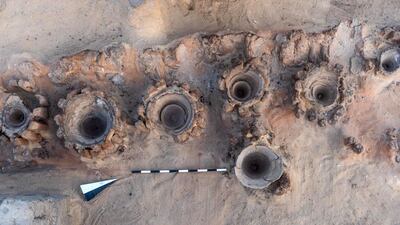A high-production brewery believed to be the world's oldest was uncovered by a team of archaeologists at the Abydos funerary site in southern Egypt, the tourism ministry said on Saturday.
"The joint Egyptian-American archaeological mission, headed by Dr Matthew Adams of New York University, and Dr Deborah Vischak of Princeton University, working in North Abydos, Sohag, uncovered what is believed to be the oldest high-production brewery in the world," the ministry said on its Facebook page.
It quoted the secretary general of Egypt's Supreme Council of Antiquities, Mostafa Waziry, as saying the brewery probably "dates back to the era of King Narmer".
King Narmer, who ruled more than 5,000 years ago, founded the First Dynasty and unified Upper and Lower Egypt.
British archaeologists first discovered the existence of the brewery at the beginning of the 20th century but its location was never precisely determined, the ministry said.
The joint Egyptian-American team "was able to re-locate and uncover its contents", it said.
According to Mr Waziry, the brewery consisted of eight large areas that were used as "units for beer production".
Each sector contained about 40 earthenware pots arranged in two rows.
A mixture of grains and water used for beer production was heated in the vats, with each basin "held in place by levers made of clay placed vertically in the form of rings".
Dr Adams, who heads the joint archaeological mission, said studies had shown that beer was produced on a large scale, with about 22,400 litres made "at a time".
The brewery "may have been built in this place specifically to supply the royal rituals that were taking place inside the funeral facilities of the kings of Egypt", the ministry quoted him as saying.
"Evidence for the use of beer in sacrificial rites was found during excavations in these facilities," it said.
Evidence of beer-making in ancient Egypt is not new, and past discoveries shed light on such production.
Fragments of pottery used by Egyptians to make beer and dating from 5,000 years ago were discovered on a building site in Tel Aviv, the Israeli Antiquities Authority announced in 2015.
Abydos, where the latest discovery was unearthed, has yielded many treasures over the years and is famed for its temples, such as that of Seti I.
In 2000, a team of US archaeologists brought to light in Abydos the earliest known example of an ancient Egyptian solar barge, dating from the first Pharaonic dynasty about 5,000 years ago.
Egypt in recent months announced several major discoveries, which it hopes will spur tourism, a sector that suffered several blows – from a 2011 uprising to the coronavirus pandemic.
Authorities had expected 15 million tourists to visit Egypt in 2020, compared with 13 million the previous year, but the virus has kept holidaymakers away.
What did Ancient Egyptian beer taste like?
When researchers at the British Museum set out to recreate a beer that was as close as possible to what the Ancient Egyptians would have consumed, using the same methods and ingredients, they reported it was "absolutely delicious", as well as being crisp and refreshing.
The beer was made using a two-stage mash process, with an ancient-style grain called emmer. It was then fermented with a yeast culture in a porous terracotta vessel.
Hops were not used in brewing until much later on in the medieval period. However, other ingredients such as spices and dates were often added as a mark of status, which would have resulted in sweet and aromatic brews.
The Ancient Egyptians drunk the beer directly from the brewing vessel, while it was still fermenting, using clay straws.
What did Ancient Egyptians eat?
Beer and bread made from barley and emmer were the two staples consumed by Ancient Egyptians of all classes. A variety of vegetables and fruits were also widely available. The lower classes consumed fish caught in the Nile, while nobles and priests enjoyed meat, dairy products and wine.
The Ancient Egyptian diet
Bread
Beer, made from emmer
Vegetables: onion, garlic, leek, cabbage, papyrus stalk, cucumber, lettuce, turnip, radish, lentils, celery
Fruit: dates, figs, pomegranates, melons, grapes
Fish, salted and preserved
Poultry: duck, goose, quail
Meat from cows, pigs, sheep, goats, hippos, gazelles, cranes, hedgehogs
Milk and cheese
Wine, pressed from grapes
Juice made from grapes and figs
Honey
Read more about Ancient Egypt
You can now take virtual tours of historic Egyptian archaeological sites
Curse of the pharaohs in the time of Covid: should Egypt be unearthing mummies?
Huge archaeological find in Egypt includes 50 mummies and a temple
Egyptology isn't just about what we find, but who finds it – and why
Egypt unearths dozens of 2,500-year-old coffins in major discovery
Expert races against time to save Egypt’s 4,600-year-old Bent Pyramid





